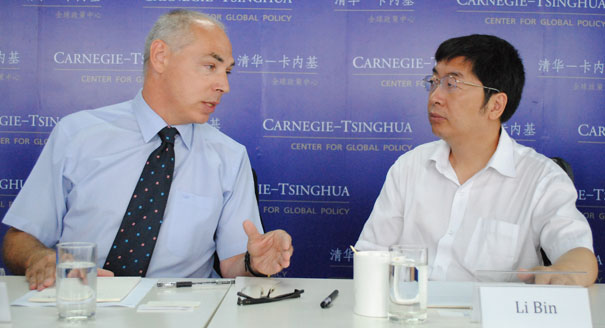Registration
You will receive an email confirming your registration.
The Middle East will continue to remain a focus in arms control efforts even as the United States gradually withdraws from the region. Energy-hungry China is increasing its already-sizable economic interests in the Middle East. As a result, stability within the region will prove to be increasingly paramount to Beijing’s foreign policy strategy.
The Carnegie-Tsinghua Center for Global Policy hosted Eyal Propper, director of the Arms Control Policy Department for Israel’s Ministry of Foreign Affairs, to discuss China’s changing role in the Middle East. Carnegie-Tsinghua’s Li Bin moderated.
Fragile Arms Control Situation in the Middle East
Revolutions in the past two years have resulted in a massive transformation of the Middle East, Propper said. However, instability still plagues the region and hampers multilateral arms control efforts.
- Syria in Flux: Propper highlighted Israeli concerns of a possible illicit arms trade between Syria and Iranian elements that provides Hezbollah operatives fighting in Syria with advanced weaponry. He cited the tens of thousands of conventional missiles allegedly given to Hezbollah since 2006. If these allegations are true, Propper stated, this would be unacceptable to Israel and could prompt direct Israeli action if discovered.
- Iran and the Bomb: Despite the impending departure of Iranian President Mahmoud Ahmajinedad’s administration and the turnover of power to incumbent president Hassan Rouhani, Propper asserted that the Iranian nuclear program remains a serious threat for Israel. Propper, who noted that he spent years trying to convince his Chinese counterparts that Iran’s nuclear program was militaristic in nature, reasserted Israeli willingness to engage in direct military action if necessary.
- Egyptian Instability: Propper stated that the recent military takeover and subsequent unrest in Egypt raises questions about the prospect for arms control agreements in the short term. The most populous Arab state, Egypt, has a history of withholding participation in regional arms treaties in protest against Israel’s stance of ambiguity toward its own nuclear capabilities, he added. He concluded that the current chaotic domestic situation is unlikely to produce shifts in Egypt’s policy.
China’s Tepid Involvement
Chinese officials and business leaders have gone to great lengths to establish commercial ties with the oil-rich nations of the Middle East. However, China’s traditional policy of avoiding messy political considerations in the region is beginning to change.
- Historically Non-Interventionist: A representative from the Israeli Embassy in Beijing explained that, since its market reforms in the 1970s, Chinese foreign policy has been isolationist in nature. This policy is solely designed to create an international environment conducive to China’s own domestic economic growth and stability. The representative added that China’s economics-above-all approach to the Middle East is representative of this policy, as evidenced by China’s continuing, albeit slightly reduced, purchases of Iranian oil in the face of tough Western sanctions.
- Increased Interest: Over the past decade, Li explained that China’s leaders have begun to reevaluate their views of the Middle East. They have made a concerted effort to learn and understand the intricacies of the situation on the ground through mostly diplomatic and business channels, asserted the embassy representative. However, shifts in China’s foreign policy take time, noted Li, and are usually responses to external events and stimuli. As such, it is unlikely that China will unilaterally intervene and attempt to aid in stabilizing the region in the short-term, instead opting for participation within the existing international system.
Future Calls for Cooperation
While Israel has repeatedly expressed support for regional cooperation, Middle East peace conferences have run into major obstacles since the early 1990s. Propper suggested that, as its traditional ally, the United States, gradually withdraws from the area, Israel will have to find new partners with interests in the region, such as China.
- Religious Extremism and Violence: Propper reminded the discussants that both Israel and China share a common interest in preventing violence from religious extremists. While there are significant differences in how Israel and China define terrorism, Propper stated that both sides could commit to greater cooperation in dismantling international terrorist networks.
- Similarities Between North Korea and Iran: Citing premature optimism for the success of the Six-Party Talks, Propper argued that North Korea was simply buying time while continuing to build up its nuclear weapons program. Recognizing that a nuclear-armed North Korea continues to be a major thorn in the side of Chinese foreign policymakers, Propper warned that the same may be true of a nuclear-armed and emboldened Iran if tougher sanctions are not imposed by the international community.
